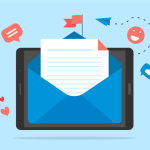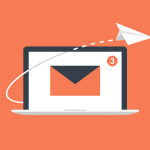Introduction.
Email marketing is far from dead. It remains one of the most powerful digital marketing strategies available.
But here’s the thing: managing campaigns, tracking engagement, and personalizing messages can quickly become overwhelming. That’s where Artificial Intelligence (AI) steps in and changes the game.
AI isn’t just a buzzword; it’s a reality that’s making email marketing more efficient and effective. But, before jumping into how AI reshapes email marketing, let’s understand why this matters so much.
Why AI in Email Marketing Matters
The success of any email marketing campaign depends on several factors: timing, personalization, relevance, and engagement.
According to recent studies, personalized email campaigns can drive up to 6x higher transaction rates. However, doing this manually isn’t practical, especially if you’re dealing with a vast subscriber base.
That’s where AI can simplify the whole process, helping you personalize emails on a large scale while optimizing for better results.
Think about it: wouldn’t it be great if your email campaigns ran themselves, learning from previous interactions and becoming more engaging and relevant over time? That’s exactly what AI can do.
By automating routine tasks, analyzing data for better targeting, and predicting customer behaviour, AI tools make it easier to connect with your audience and increase the overall ROI of your email marketing efforts.
What I’ll Cover in This Guide
I’ll walk you through how to use AI for email marketing, step by step. I’ll touch on what AI-powered email marketing tools are available, how to use them effectively, and the pros and cons you should be aware of before diving in.
If you’re ready to turn your email marketing efforts into a well-oiled, data-driven machine, keep reading.
How AI Transforms Email Marketing
- Personalization at Scale Imagine being able to send each subscriber a unique message tailored to their behaviour and preferences. AI analyzes vast amounts of data to make this possible, from browsing history to purchase behaviour. According to Campaign Monitor, personalized emails generate a median ROI of 122%, which is four times higher than non-personalized efforts.
- Better Subject Lines Crafting subject lines that people will click on is both an art and a science. AI tools like Phrasee use natural language processing to create engaging and optimized subject lines, boosting open rates. It’s not just guesswork anymore; AI learns what works and improves over time.
- Automated A/B Testing A/B testing can be time-consuming, but AI streamlines this by running multiple tests simultaneously and even analyzing which elements work best. With automated A/B testing, you can refine your email content and layout, ensuring you’re always putting your best foot forward.
The Pros and Cons of Using AI in Email Marketing
Pros:
- Time-saving: AI takes over repetitive tasks like scheduling and analyzing campaign performance, so you have more time to focus on strategy.
- Improved Personalization: AI tools use data to personalize content, making your emails more relevant and engaging.
- Enhanced Analytics: Get better insights into customer behaviour, allowing you to tweak your campaigns for maximum effectiveness.
- Optimized Send Times: AI can analyze data to determine the best times to send emails for higher engagement.
Cons:
- High Initial Costs: Investing in AI tools can be expensive, especially for small businesses. However, the long-term ROI often makes up for it.
- Data Privacy Concerns: Using AI means handling a lot of customer data, which raises privacy issues. You’ll need to be transparent and comply with regulations like GDPR.
- Lack of Human Touch: While AI can write and optimize content, it may still lack the emotional depth that comes with human-authored content.
Popular AI Tools for Email Marketing
- Mailchimp with AI Capabilities: Uses AI to suggest the best content and send times. It’s beginner-friendly and comes with powerful analytics.
- HubSpot: Great for automating email sequences and using AI to predict customer behavior.
- Sendinblue: Uses AI for advanced personalization, like segmenting your audience based on how they interact with your emails.
How Do I Start Using AI in My Email Marketing?
- Analyze Your Current Strategy: Before adding AI into the mix, review your existing campaigns to understand where you need help. Are your open rates suffering? Are people not clicking through to your site? AI might be able to help.
- Choose the Right Tool: Not all AI tools are created equal, so choose one that fits your needs. If you’re focused on subject lines, a tool like Phrasee might be ideal. For full-scale automation, try platforms like ActiveCampaign or Mailchimp.
- Start Small: Don’t try to automate everything right away. Start with something simple, like optimizing send times, and gradually add more AI features as you get comfortable.
- Monitor and Optimize: AI is not set-it-and-forget-it. Keep an eye on your campaigns and be ready to tweak your strategy as you gather more data.
FAQ
1. Is AI suitable for small businesses?
Yes, many AI tools are scalable and offer plans for small businesses. While initial costs can be high, the efficiency gains and ROI often outweigh the investment.
2. Can AI write my emails for me?
Yes, to some extent. AI can generate content, but it’s best to review and personalize it to add a human touch.
3. How secure is using AI in email marketing?
Security depends on the tool you’re using. Make sure you choose a platform that complies with data protection regulations.
4. Do I still need a human team?
Absolutely. While AI handles automation and data analysis, your human team brings creativity and emotional intelligence that AI lacks.
Conclusion
Email marketing, powered by AI, is no longer just an option—it’s becoming a necessity for staying competitive. From automating routine tasks to providing deep customer insights, AI tools can take your campaigns to a whole new level.
So, is it worth diving into AI for your email marketing strategy? I’d love to hear your thoughts. Are you ready to embrace AI, or do you still have reservations? Let me know what you think.





GIPHY App Key not set. Please check settings